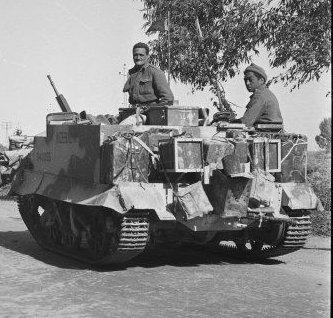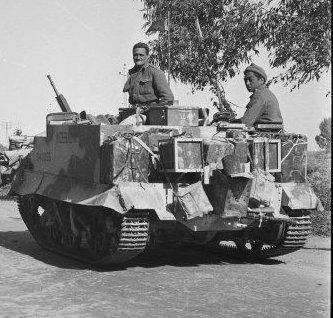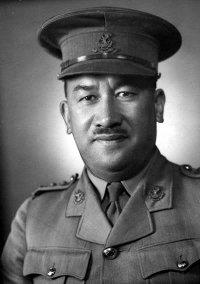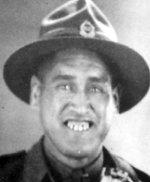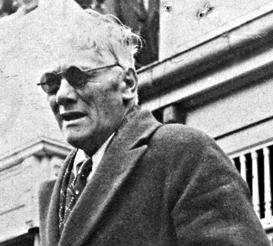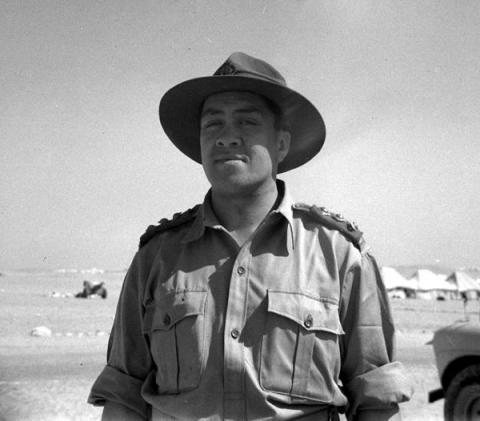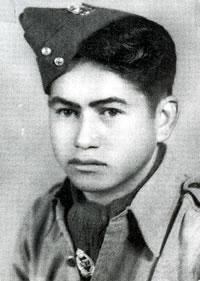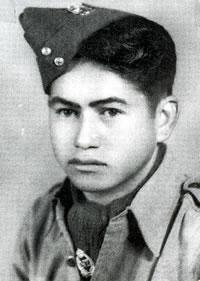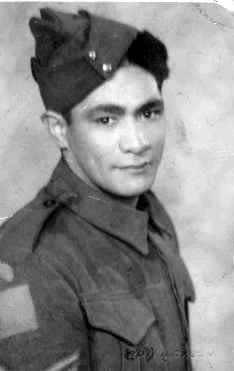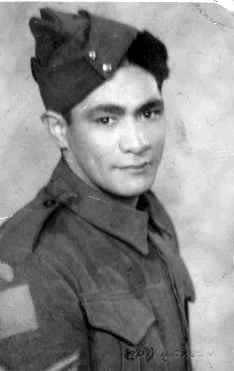<p><strong>Te Tohara (Charlie) Mohi grew up in Pakipaki. He embarked for war in 1941 and served with the Maori Bren-carrier platoon. </strong><strong>Charlie returned on furlough in 1945, see the photo <a href="/node/22923">here</a>.</strong></p><p><strong>After leaving New Zealand the Reinforcements docked at Freemantle for a short while.<br /></strong></p><h2><strong>Transcript<br /></strong></h2><p><strong>Te Tohara Mohi: </strong>Engari te taenga atu ahua tata atu matou ki Ahitereiria ra, ko au tetahi ano te, o te, o nga Kaari o te o te tima, ta matou mahi e whakatutu haere i a matou to matou Apiha, e kore e maungia atu he pia ki waho, e tama, i aua wa ra kua pia katoa nga wa, nga tima. </p><p>To matou taenga atu ki a Freemantle, ki Perth. Tae atu matou ki Freemantle, a, kare matou e tukua kia haere ki runga i te whenua haere, oh, ki roto i te taone. Te mataku o nga, o matou apiha, kei puta atu matou kare hoki e whakaengia nga Ahitereiria kia haere atu ki te whenua ra. No te mea ko tera te tuatahi o nga raupatutanga i a ratou, o nga hoia o tera taha. A, ka tuku atu a ratou kia hoki atu ki to ratou whenua, hei, ngaro to reo. A, koa oti ta matou mahi i reira ka tae mai nga tima o, o tahaki, mau mai ngia a nga kai mo to matou waka, mo to matou tima, a, nga mea toa o matou kua heke atu ki runga i nga, ki nga tima paku, a hoki atu ki te, ki te taone, ki reira karia ka haere. Mahi porangi, haurangi noa, a, ka karangahia matou kia haere ki te tiki, ah well, to matou taenga atu ki reira, ka ngaro ano hoki matou.</p><p>Koinei nga mahi tinihanga, nga mahi a te hoia, to matou hoki mai tanga ki, ki runga i to matou waka, ah well, ka karanga mai ngia e Bully Jackson, “Haramai Mohi.” I said, “He aha tena Bully?” “Kia tangongia atu te mea nei.” A, ko Bully hoki to matou apiha, a ko Bully ae, he Apiha pai.</p><p><strong>Pou Temara: </strong>Ana, ka tangohia atu nga stripes.</p><p>A, ka tangongia atu. E rua, toru, iwa kare tahi hoki he Heihana naku i timata ka homaingia ano.</p>
Media library
Audio
<p><strong>Sound file</strong> from Ngā Taonga Sound & Vision, ref: <a href="https://www.ngataonga.org.nz/collections/catalogue/catalogue-item?recor…;. Any re-use of this audio is a breach of copyright.</p><p><strong>Image<br /></strong>Crop of <a href="/node/3856" target="_blank">full photo</a> - Bren-carrier platoon leads the Maori Battalion into Tripoli, 23 January 1943. Sgt Te Whiu Purei (standing) and Charlie Mohi, seated.</p>
<p><strong>Te Tohara (Charlie) Mohi grew up in Pakipaki. He embarked for war in 1941 and served with the Maori Bren-carrier platoon. </strong><strong>Charlie returned on furlough in 1945, see the photo <a href="/node/22923">here</a>.</strong></p><p><strong>When Charlie arrived in Egypt on June 29th, 1941 he was admitted into hospital with a bout of pnuemonia. Here he recounts his experience in the South African run hospital in Suez. <br /></strong></p><h2>Transcript</h2><p>Ta matou mahi. Engari to matou taenga atu ki Ihipa, e, ka pa ki au te pneumonia. I te po tonu, e ta, i te ata tonu he hekeheke ana matou ka taenga atu e au te mau i aku peke i te taha, hinga tonu atu au, hemo tonu atu! A ka maungia i au ki ro hohipera, i Sudan, a Suez. Ka maungia au ki ro hohipera i reira, a, kua tangotango ke aku, aku tikiti, kare e mohio ke te iwi ra he aha he mangumangu, he aha ranei. Engari he toru pea nga ra katahi ano ka oho, i te kaha o te mauiui. Engari, taku ohotanga titiro atu au he Pakeha, he wahine Pakeha. Ka korero mai ki au – “are you Maowri?” Ka ruru atu taku mahunga, ka moe ano. Engari taku ohotanga, i mutu atu taku mauiuitanga, e tama, i roto au i mea, I te hohipera o nga South Africans - te iwi kare nei pirangi te mangumangu. Aue, ka pau te wehi taua iwi ra. Engari, hei aha maku. Korero mai ki au, e karawhiungia atu te Maori. Mohio tonu he ahua pai ke atu toku maramatanga toku mohiotanga i to ratou. E toru wiki au e noho ana i reira, a ka hoki atu au ki to matou ope, i te, i reira e tereina ana i Maadi. </p><p>Kua haere ke etahi o oku hoa ki te Battalion, e noho mai ana ratou, katahi tonu etahi o ratou hoki mai i mea i Greece, i Crete to ratou pana mai tanga e te Tiamana, whiua mai ratou i waho. Hoki mai ratou, a, Kabrit pea te ingoa o taua kainga, kua wareware i au nga ingoa. A, ka haere au ki reira, a ka kite au nga mea o te kainga, nga mea o te ope tuatahi, a taku tuakana. E tama, to matou taenga ki reira, whakamahia matou. Ko matou noa iho nga mea mahi, ko nga Reinforcements, e tama! Ko te mea, te ope tuatahi, e ta, kei ro moenga ke e noho ana. A, mai i tera wa kare ano au e puta atu, e uru atu ki te mea, ki taku company. Ko te C Company, i haere atu i te taha o te C Company i konei, a, noho tonu au ki C Company, a ka maungia au ki ro Headquarters Company i roto i nga Bren Carriers. A, he rawe tera, kare hoki i haerere ma o waewae koe e mau, ma te motoka matou, ma te Bren Carrier ke koe e mau. A noho tonu au i roto i te Bren Carrier a mutu noa atu i te whawhai. A matou mahi oh well.</p>
<p><strong>Sound file</strong> from Ngā Taonga Sound & Vision, ref: <a href="https://www.ngataonga.org.nz/collections/catalogue/catalogue-item?recor…;. Any re-use of this audio is a breach of copyright.</p><p><strong>Image</strong> Crop of <a href="/node/3856" target="_blank">full photo</a> - Bren-carrier platoon leads the Maori Battalion into Tripoli, 23 January 1943. Sgt Te Whiu Purei (standing) and Charlie Mohi, seated.</p>
<p>Tiwi (Eruera Te Whiti) Love (Te Āti Awa, Ngāti Mutunga, Ngāti Tama, Ngāti Te Whiti) speaks in a recorded public broadcast from North Africa, 24 September 1941.</p>
<p><strong>Sound file</strong> from <a href="https://www.ngataonga.org.nz">Ngā Taonga Sound & Vision</a>. Any re-use of this audio is a breach of copyright.</p><p><strong>Image reference:<br /></strong><a href="http://timeframes.natlib.govt.nz/">Alexander Turnbull Library</a><br />Reference: 1/2-036961-F<br /> Permission of the Alexander Turnbull Library, National Library of New Zealand, Te Puna Mātauranga o Aotearoa, must be obtained before any re-use of this image.</p>
<p><strong>Matehaere Huriwai bids farewell. Matehaere, also known as Paenoa, was from Tikitiki on the East Coast. He served with C Company and embarked with the <a href="/node/4967#MainBody" target="_blank">Main Body</a>. </strong><strong></strong></p><p><strong>This very short recording was made after the official farewell ceremony to volunteers from the Tairawhiti region at Gisborne on 27 March 1940. A</strong><strong>t that point</strong><strong> the men were boarding their buses.<br /></strong></p><p>(Site administrator's note: there is a lot of static throughout the audio).</p><h2>Transcript</h2><p><strong>Radio announcer:</strong> What’s your name?<br /><strong>Huriwai:</strong> Huriwai<br /> <strong>Radio announcer:</strong> Just say goodbye to anybody you’d like to, we’re on the air, 2ZM here.<br /><strong>Huriwai:</strong> Aah, tae atu nei [ki] ngā tāngata o Tikitiki. Kia ora koutou and good luck to you all.</p><p> </p>
<p><strong>Sound file</strong> from <a href="https://www.ngataonga.org.nz">Ngā Taonga Sound & Vision</a>. Any re-use of this audio is a breach of copyright.</p><p>Photograph from Nga Taonga a Nga Tama Toa Trust</p>
<p><strong>Te Aitanga a Māhaki leader Henare Ruru farewells troops from the dias in Peel Street, Gisborne on 27 March 1940. </strong> <strong>His speech is followed by a performance of the First World War song <em>Te Ope Tuatahi</em> that was composed by Sir Apirana Ngata.</strong> <br /><br />(Site administrator's note: there is some static and background noise throughout the audio).</p><h2>Transcript</h2><p><strong>Henare Ruru:</strong> Deputy Mayor, Colonel, tēnā koutou. Residents of Gisborne and the surrounding county, oh...<br /><br /><strong>Announcer:</strong> He wasn’t speaking into the other microphone. <br /><br /><strong>Henare Ruru:</strong> First, I will confess to you, my English is limited. I’m here this afternoon to fill in the gap, also, for the speaker Sir Āpirana Ngata, he’s away, he had to be called to Wellington. And I’m here to do my best to speak to you. <br /><br />Residents of Gisborne and the surrounding district, it’s gratifying to see such a crowd, standing around, members of the Second Echelon and the Māori Battalion. Its the only, part of our duty as a stay home Battalion to muster and say “haere ra” to these boys. A gathering such as this, sufficient for these boys to realise the job they’re going to tackle is important. They themselves is [are] important and the contract they’re going to attack is a very important one. By our presence here this afternoon, they would realise that – tēnā koutou. (Kia ora)<br /><br />Members of the Second Echelon and the Māori Battalion. Today you stand at Peel Street, a section of the British army. You are on active service, New Zealanders, New Zealand small in number. But they are attached to the British army, they are attached to the Navy, they are attached to the Air Force, they are attached to the land force, they are attached to the Eastern and Western front. You here standing in Lowe Street are part of that army. Now boys, you’re going to do your job - we stay-homers have a mind with you. You’re trained for the job, you’re trained how to act as a soldier, you’re trained, your knowledge is trained and knowledge should be required as a soldier. But there are some aspects [that] belongs to you, and that is these: one is courage, one is determination – it’s in you, you’re born with it, grown with it. You wasn't teached with these two actions, belongs to you. And we’re proud that you’re leaving us to perform a duty laid down by those ‘Big heads’ a few years ago. England expects everyman will do his duty; you’re going to perform on that duty. That’s the duty that you’re going to perform today. You’re moving the youth and act on that duty. You’re going to act upon it. You shall do so because of the courage of every New Zealander, Māori and Pākehā, its in you, born with you. You are told right throughout New Zealand what the New Zealanders did in 1914 and 18. Today we know it’s a credit to us to New Zealanders Māori and Pākehā. Those boys returned decorated with a name called Anzac. Anzac was gained by deeds and by results in action. They were honoured and decorated with that name and you [are] asked today to equal that and you can. One of the points that you can is this, when you get over there, get hold of that naughty little boy Hitler, give him a jolly good hiding. When you achieve that, we shall gain our liberty, our freedom and peace. You'll do it for us we know you would. <br /><br />Ladies and gentlemen, I think I’ve shouted enough. You know the balance of our minds, that is this: Tamariki Māori mā, haere, kia māia, kia toa. I akongia koutou ki te hōiatanga, i akongia koutou ki te tāwhai ngā waewae, ki te titiro ngā kanohi, ki te whātoro ngā ringaringa. Ko te māia, ko te toa kai roto i a koutou i heke iho i o koutou tipuna. Kāore tēnā e taea te ako ki a koutou, kei roto tonu hoki i a koutou. Ko te hōiatanga, ko te ahatanga, ko te ‘left right left right’ ka akongia koutou. Kia ora koutou, haere. Whakatipungia he ingoa mo tātou, mo o koutou whakatipuranga, a muri ake nei. <br /><br />God speed and a safe return. Good luck to you.<br /><br />Taku pao kia koutou, taku pao kia koutou, kai ngā tamariki wāhine nei.</p><p>(Words for supporting song: <em>Te ope tuatahi</em>)</p><p>E te ope tuatahi<br />No Aotearoa<br />No Te Waipounamu<br />No nga tai e wha<br />Ko koutou ena<br />E nga rau e rima<br />Ko te Hokowhitu toa<br />A Tumatauenga<br />I hinga ki Ihipa<br />Ki Karipori ra ia<br />E ngau nei te aroha<br />Me te mamae</p><p>E te ope tuarua<br />No Mahaki rawa<br />Na Hauiti koe<br />Na Porourangi<br />I haere ai Henare<br />Me to Wiwi<br />I patu ki te pakanga<br />Ki Paranihi ra ia<br />Ko wai he morehu<br />Hei kawe korero<br />Ki te iwi e<br />E taukuri nei</p><p>E te ope tuaiwa<br />No Te Arawa<br />No Te Tairawhiti<br />No Kahungunu<br />E haere ana ‘hau<br />Ki runga o Wiwi<br />Ki reira ‘hau nei<br />E tangi ai<br />Me mihi kau atu<br />I te nuku o te whenua<br />Hei konei ra e<br />E te tau pumau</p><p><br /><br /></p>
<p><strong>Sound file</strong> from <a href="https://www.ngataonga.org.nz">Ngā Taonga Sound & Vision</a>. Any re-use of this audio is a breach of copyright.</p><p>Photograph from the personal collection of Matire (Tum) Glover (granddaughter of Henare Ruru) and trustee on the Nga Taonga a Nga Tama Toa Trust.</p><p>Song words for <em>Te Ope Tuatahi </em>from James Cowan, <em>The Maoris in the Great War</em>, Maori Regimental Committee, 1926, p.179</p>
<p>Canon Wi Huata talks about the farewell at the boat as the Battalion left Wellington, life on board, being the only Anglican priest and giving communion to hundreds of soldiers.</p><h2>Transcript (edited)</h2><p><!--[if gte mso 9]><xml>
Normal
0
false
false
false
MicrosoftInternetExplorer4
</xml><![endif]--><!--[if gte mso 9]><xml>
</xml><![endif]--><!--[if !mso]><object
classid="clsid:38481807-CA0E-42D2-BF39-B33AF135CC4D" id=ieooui></object>
<style>
st1\:*{behavior:url(#ieooui) }
</style>
<![endif]-->
<!--[if gte mso 10]>
<style>
/* Style Definitions */
table.MsoNormalTable
{mso-style-name:"Table Normal";
mso-tstyle-rowband-size:0;
mso-tstyle-colband-size:0;
mso-style-noshow:yes;
mso-style-parent:"";
mso-padding-alt:0cm 5.4pt 0cm 5.4pt;
mso-para-margin:0cm;
mso-para-margin-bottom:.0001pt;
mso-pagination:widow-orphan;
font-size:10.0pt;
font-family:"Times New Roman";
mso-ansi-language:#0400;
mso-fareast-language:#0400;
mso-bidi-language:#0400;}
</style>
<![endif]-->
</p><p>One, when
they farewell you, very very touching. The
one that will stand out to all soldiers will be his mother. Because 80% of the Māori Battalion were
single. So, and that's the scene when we
left. So you get onto the boat. And by the way when you get onto the boat I
was the only Anglican Priest so I was in charge of all the Anglicans, for the
boat, not only the Māori Battalion because being the only Anglican. There were several of us, got on the boat and
then and this stays in you because actually you're going away to die. You look back, I can remember fellas singing
and we're just looking at Wellington.
Tears coming down our eyes and we were leaving home, thinking of our mothers. Because I was asked the question why the
mothers, I think because 80% of us were single.
That's the only person that came to us.
Nevertheless ... life on the boat, because one I'm a padre. The rule of the boat for the Māori Battalion
was church parade every morning, every morning.
I think we were the only division on the boat who had a regular programme. We had it every morning and every
evening. I think the rest of the padres
they had theirs the other way - whoever wants to come. I said no it's a rule I've introduced.
Everything went ahead sports and boxing.
But everlasting thinking of home.
I think that goes for the Pakeha as well. I used to take the communion. I used to start the communion at 3am and then
go 4, 5, 6, 7, 8. I can remember
knocking off at 8. After 8 o'clock "I'd
say look I'm hungry now we go for breakfast" and we'd come back and start
again. In order to cope with the people,
oh hundreds, you know I think because the background everybody wants it. I'd been responsible for that. Strange too, one thing about the war you
become very strong within your own religion, I noticed this with the pākehā...</p>
<p> </p>
<p>Extract from Interview with Canon Wiremu Huata, interviewer Margaret Northcroft, recorded 25 June 1991. </p>
<p>From the collections of the Alexander Turnbull Library Oral History and Sound collection, OHColl-0291-1. All rights reserved. Permission of the Alexander Turnbull Library must be obtained before any re-use of this sound file </p>
<p>From an interview between Maiki Parkinson (<a href="/node/2199">Jules Vern Parkinson</a>, 67603) and Megan Hutching. </p><p>Maiki
Parkinson, Te Aitanga-a-Māhaki, describes being accepted into the army at Papakura Camp and the exciting train trip to Wellington. </p>
<div class="field-items"><div class="field-item odd"><p>Jerome (Maiki or Jules) Parkinson (1924-2006), interviewed by Megan Hutching, 23 March
2004, for the <em>Second World War oral
history project - North Africa</em></p>
<p>From the collections of the Alexander
Turnbull Library Oral History and Sound collection, OHInt-0798-12. All rights reserved. Permission of the <a href="http://www.mch.govt.nz/">Ministry for Culture and Heritage</a>
must be obtained before any re-use of this sound file. </p><p> </p><p>Image: Maiki Parkinson. </p></div></div>
<p>From an interview between Maiki Parkinson (<a href="/node/2199">Jules Vern Parkinson</a>, 67603) and Megan Hutching. </p><p>Maiki Parkinson, Te Aitanga-a-Māhaki, was born at Ōpōtiki in 1924. Here he describes hearing about the war and enlisting at Papakura Camp as a 16 year old. He talks about how sad it was that he only had 10 minutes to say goodbye to his parents. </p>
<div class="field-items"><div class="field-item odd"><p>Jerome (Maiki or Jules) Parkinson (1924-2006), interviewed by Megan Hutching, 23 March
2004, for the <em>Second World War oral
history project - North Africa</em></p>
<p>From the collections of the Alexander
Turnbull Library Oral History and Sound collection, OHInt-0798-12. All rights reserved. Permission of the <a href="http://www.mch.govt.nz/">Ministry for Culture and Heritage</a>
must be obtained before any re-use of this sound file. </p><p> </p><p>Image: Maiki Parkinson. </p></div></div>
<p>Interview between <a href="/node/555" title="See Patira Edwards' record">Patira Edwards</a> (25844) and Megan Hutching.</p>
<p>Patira Edwards describes the trip out from New Zealand. Patira sailed for Egypt with the 4th Reinforcements on the Polish liner-turned-troop ship <em>Batory</em> in November 1940.</p>
<p>Patira Edwards, Ngāpuhi (1919-2005), interviewed by Megan Hutching, 27 November 2000, for the <em>Second World War oral history project - Crete</em></p>
<p>From the collections of the Alexander
Turnbull Library Oral History and Sound collection, OHInt-0729-08. All rights reserved. Permission of the <a href="http://www.mch.govt.nz/">Ministry for Culture and Heritage</a>
must be obtained before any re-use of this sound file </p>
<p>Image: Patira Edwards. </p>
<p>Interview between <a href="/node/555" title="See Patira Edwards' record">Patira Edwards</a> (25844) and Megan Hutching.</p><p>Patira Edwards describes life at Maadi Camp before joining the Battalion. Patira had sailed for Egypt with the 4th Reinforcements on the Polish liner-turned-troop ship <em>Batory</em> in November 1940.</p>
<p>Patira Edwards, Ngāpuhi (1919-2005), interviewed by Megan Hutching, 27 November 2000, for the <em>Second World War oral history project - Crete</em></p>
<p>From the collections of the Alexander
Turnbull Library Oral History and Sound collection, OHInt-0729-08. All rights reserved. Permission of the <a href="http://www.mch.govt.nz/">Ministry for Culture and Heritage</a>
must be obtained before any re-use of this sound file </p>
<p>Image: Patira Edwards. </p>

